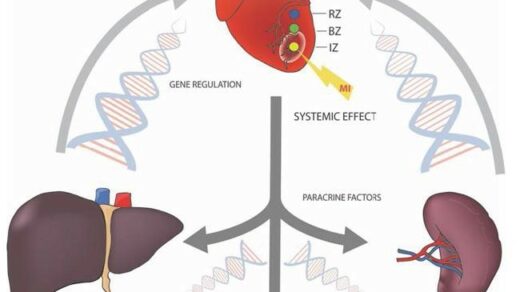Read short summaries of the latest oncology-focused research published in this week’s issue of Oncotarget, Volume 12, Issue 17.

Oncotarget’s Volume 12, Issue #17
New Publications
Cover (Research Paper): Scent test using Caenorhabditis elegans to screen for early-stage pancreatic cancer
Origin: Osaka, Tokyo, Japan
Institutions Osaka University, Hirotsu Bio Science Inc.
Quote: “Similar to sniffer dogs, the use of Caenorhabditis elegans has been introduced as a new strategy for detecting cancer-associated scents during cancer screening. Aside from having an excellent sense of smell, C. elegans is easy to handle, inexpensive, and quick to breed.”
Research Paper: The role of circulating miRNAs and CA19-9 in pancreatic cancer diagnosis
Origin: São Paulo, Marilia, Brazil
Institutions: University of São Paulo,University of Marilia
Quote: “Diagnosis and treatment of pancreatic ductal adenocarcinoma (PA) remains a challenge in clinical practice. The aim of this study was to assess the role of microRNAs (miRNAs-21, -23a, -100, -107, -181c, -210) in plasma and tissue as possible biomarkers in the diagnosis of PA.”
Research Paper: Diverse transcriptional regulation and functional effects revealed by CRISPR/Cas9-directed epigenetic editing
Origin: Amsterdam, The Netherlands
Institution: The Netherlands Cancer Institute
Quote: “Here, we have taken advantage of CRISPR/dCas9 technology adapted for epigenetic editing through site-specific targeting of DNA methylation to characterize the transcriptional changes of the candidate gene and the functional effects on cell fate in different tumor settings.”
Research Paper: The protective role of Prolyl oligopeptidase (POP) inhibition in acute lung injury induced by intestinal ischemia-reperfusion
Origin: Messina, Italy
Institution: University of Messina
Quote: “Based on these findings, the aim of the present study was to assess the beneficial outcomes of POP-inhibition in lung disease induced by an experimental mouse model of intestinal ischemia performed by SAO shock-mediated injury.”
Research Paper: Quantitative difference of oral pathogen between individuals with gastric cancer and individuals without cancer
Origin: Belém, Pará, Brazil
Institutions: Federal University of Pará, Ophir Loyola Hospital, Foundation Center for Hemotherapy and Hematology, Federal Institute of Pará
Quote: “The loss of teeth and lack of oral hygiene have been associated with the risk of developing gastric cancer (GC) in several populations evidenced in epidemiological studies. In this study, we quantitatively compared the proportion of oral pathogens in individuals with gastric cancer and individuals without cancer in a referral hospital in the city of Belém, Brazil.”
Research Paper: Exosomal and non-exosomal miRNA expression levels in patients with HCV-related cirrhosis and liver cancer
Origin: Moscow, Russian Federation
Institution: Peoples’ Friendship University of Russia
Quote: “In this research we have tried to identify what miRNA fraction in plasma – exosomal or not packed into exosomes (non-exosomal) – is stronger associated with primary liver cancer. The second question was whether saliva miRNA expression levels – both exosomal and non-exosomal – are associated with primary liver cancer.”
Editorial: Mantle cell lymphoma patients in first relapse: we pretty much know what to do
Origin: Verona, Italy
Institution: University of Verona
Quote: “Treatment of relapsed mantle cell lymphoma (MCL) patients is challenging. Disease behavior has typically
been described to be largely heterogeneous [1]. The MANTLE-FIRST study, the first patient-level analysis of outcomes of relapsed-refractory (r/r) MCL after rituximab and cytarabine containing induction therapy, has clearly divided patients’ outcome depending on time to first relapse (early- versus late-POD) [2, 3].”
Editorial: UBE2T: A new molecular regulator of cancer stemness in hepatocellular carcinoma
Origin: Hong Kong, China
Institution: The Hong Kong Polytechnic University
Quote: “Hepatocellular carcinoma (HCC) ranks the 4th leading cause of cancer mortality in the world [1]. Accumulating evidence has emerged in support of the critical role of cancer stem cells (CSCs) to the poor survival of HCC patients as they promote chemoresistance, tumorigenicity and metastasis [2].”
Research Perspective: Hypofractionation: less is more?
Origin: Manchester, Northwood, London, United Kingdom; Colombo, Sri Lanka
Institution: The Christie NHS Foundation Trust, University of Manchester, Ministry of Health, Mount Vernon Cancer Centre, The Institute of Cancer Research
Quote: “One third of patients with bladder cancer present with muscle invasive bladder cancer (MIBC) which has a poor prognosis. International guidelines for the management of MIBC recommend radical cystectomy or bladder-preserving treatment based on radical radiotherapy with a form of radiosensitisation.”
Click here to read Oncotarget’s Volume 12, Issue #17.
YOU MAY ALSO LIKE: More Oncotarget Videos on LabTube
—
Oncotarget is a unique platform designed to house scientific studies in a journal format that is available for anyone to read—without a paywall making access more difficult. This means information that has the potential to benefit our societies from the inside out can be shared with friends, neighbors, colleagues, and other researchers, far and wide.
For media inquiries, please contact media@impactjournals.com.



